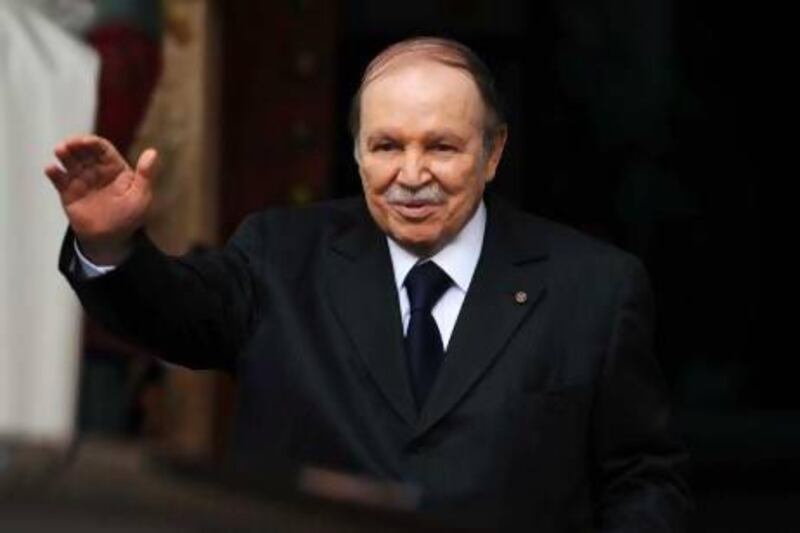ALGIERS // The president of Algeria was sent to a Paris hospital yesterday after suffering a mini-stroke on Saturday, raising questions about the future of his 14-year rule.
Abdelaziz Bouteflika, 76, experienced a brief blockage of blood to the brain known as a transient ischemic attack, Rachid Bougherbal, director of the National Centre for Sports Medicine in Algeria, toldthe state state news agency APS.
His condition is stable and "does not give rise to particular concern" a medical source told APS, which also quoted the prime minister, Abdelmalek Sellal, saying that the president's condition is "not at all serious".
But later, the news agency announced that he had been moved to Val de Grace hospital in Paris for further tests. The agency rarely reports on the health of the president, which has been rumoured for some time to be poor.
Patients usually recover from such blockages but have an increased risk of suffering a full stroke, especially if they are over 60, according to the British Stroke Association.
According to an Associated Press from 2005, Mr Bouteflika was hospitalised for three weeks in Val de Grace hospital after suffering an internal haemorrhage.
In an interview with state television during which he strugled to speak, the president said at the time that Algerians had "no reason to be worried", while his physician said hat he was "completely healed".
In early 2006, Mr Bouteflika spent a week undergoing post-operative medical exams at the same hospital. Several months later he disappeared from public view for 50 days, again feeding the rumour mill.
Then, a year after his surgery, he said he had been "very, very sick" but had "come out absolutely fabulous", emphasising that "people need to stop talking about my health."
The latest incident comes as Mr Bouteflika nears the end of a third term as president of the North African republic, with elections set for next year. Algeria has an elected assembly of parliamentarians who ratify laws, and a separately elected president, although analysts attribute more power to an elite group of powerful business and military figures that the government.
The president's latest health scare pitches the question of his health and fitness to rule into an already heated public debate about a controversial amendment to the constitution proposed to allow him to run for a fourth term. He was first elected in 1999 and re-elected in 2004. Mr Bouteflika was re-elected in 2009 when the constitution was amended to allow a third term.
The Algerian media is generally lively in its criticism of the government, but has only recently begun to direct scorn at the president himself. Last week, Al Khabar newspaper published a cartoon of him proudly holding a revised constitution while haggard Algerians say "what is he talking about?".
The news of his health scare also comes when complaints by ordinary Algerians about their ruling class are growing.
Many of the political and military elite who control the country derive their political legitimacy from their credentials fighting in the 1954-1962 war of independence against the French and they are increasingly perceived as out of touch with the needs of a country where the median age is 27. A US embassy cable to Washington sent in 2008 by the then ambassador Robert Ford and released by the anti-secrecy agency WikiLeaks said that corruption at levels up to and including the president and his brother Said, said to be a member of his inner circle of advisers, was stifling the country.
It is a view shared by other Algerians.
"President Bouteflika has adopted a political agenda where everything can, in theory, change: the constitution, electoral law, public life, the composition of parliament ... except him," wrote Ihsane El Kadi, an editor at the Algerian news website Maghreb Emergent, in a 2011 paper examining the Algerian government's moves to avoid an uprising similar to those experienced in neighbouring Tunisia and Libya.
Mostefa Bouchachi, an opposition parliamentarian, said that he hoped for a change in the presidential elections next year. It is still possible that Mr Bouteflika could be re-elected, he said, but his health issues - and a recent media focus on corruption scandals - may make this impossible.
The question, said Mr Bouchachi, was whether powerful political and military figures would put forward a similar figure from their elite circles for election, or whether change could come. Maybe, he said, "they are tired of running the country this way and they are aware of the danger that they are getting the country into. And they will decide, I hope, to have an open election."
* afordham@thenational.ae
twitter: For breaking news from the Gulf, the Middle East and around the globe follow The National World. Follow us





